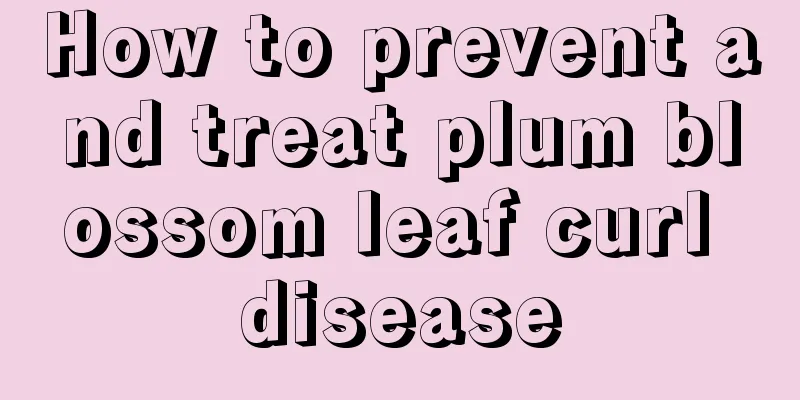How to prevent and treat plum blossom leaf curl disease

Symptoms of harmIt mainly occurs in spring, and the first to be affected are the new buds and leaves. The internodes of the young shoots become thicker and shorter, the leaves grow densely, the leaf surface becomes wrinkled and thickened, fleshy, rough, and curled toward the back of the leaves. The diseased leaves are initially yellow, red or purple, then gradually turn grayish white and powdery substances appear. When the disease occurs seriously, the diseased shoots will die, the tree will become weak, and the number of flowers will decrease.Disease patternThe host is usually infected by spores. After overwintering on the inner and outer shoots of the host bud scales, the pathogen begins to infect in early April of the following year. The disease becomes more serious in early May and stops in June . The pathogen infects once a year , and reinfection occurs occasionally. However, due to high temperatures and unfavorable conditions, the damage is not significant. A cool, humid climate is most suitable for spore germination and infection. Around 20 ℃ is most suitable for the growth of pathogens. At 28 ℃, the growth of pathogens is inhibited and the disease cannot occur. Continuous rain or foggy weather in early spring is not conducive to the occurrence of diseases.How to prevent and treatIf pruning is needed in winter, be sure to pick up the fallen plum leaves and branches and clean the plum garden. In combination with winter pruning, when managing topdressing, apply more well-rotted high-quality organic fertilizers and phosphorus and potassium fertilizers, and less or no nitrogen fertilizer, to promote the healthy growth of plum branches and leaves and improve the plant's resistance to plum leaf curl disease.If pruning is necessary in spring, take the diseased branches and leaves out of the garden and burn them in one place to reduce the source of pathogens for the next year. When cutting off diseased branches and leaves, soak the scissors in 1 : 1 : 100 Bordeaux liquid for 3 to 5 minutes before cutting. When the leaf buds of plum blossoms are just expanding, you can spray 5 degrees Baume lime sulfur mixture or 1 : 1 : 100 Bordeaux mixture. Spray 1 to 2 times a year for 2 to 3 years, the effect will be better. Note that when spraying the medicine, be sure to spray it evenly so that the medicine liquid forms a film. For potted plum blossoms, in addition to pruning and cutting leaves in winter and spring, and burning diseased branches and leaves away from the pots, the environment around the pots should be kept dry, which will help inhibit the occurrence of pathogens. If plum leaf curl disease has occurred, spray each pot with the above-mentioned medicine and concentration. |
<<: What to do if the leaves of Areca palm droop
Recommend
What does a dandelion look like? What kind of dandelion is it?
1. What does it look like? Dandelion is a perenni...
Can Osmanthus fragrans be propagated by cuttings?
Osmanthus fragrans is an evergreen shrub or small...
Can Christmas cactus be seen with light at night? What fertilizer should be used?
1. Can you see the light? When growing Christmas ...
How many snake plants should be planted in one pot? Should I use a deep pot or a shallow pot?
1. How many seeds should be planted in one pot? W...
Time and method of planting water spinach cuttings
Water spinach cutting planting time Water spinach...
How to trim pitcher plants
How to prune the branches and leaves of Nepenthes...
Cultivation methods and precautions of potted golden diamond
1. Breeding methods 1. Light: It is not demanding...
Do mountain turtles prefer shade or sun?
Do mountain turtles prefer shade or sun? Mountain...
How to propagate Oxalis purpurogenum
How to propagate Oxalis purpurogenum There are ge...
What is hemp?
What kind of crop is hemp Hemp is one of the anci...
What flowers are suitable for growing in Harbin? What are the city flowers and trees?
1. Harbin's Climate Characteristics Harbin ha...
How to care for Orange Monroe seedlings?
Orange Monroe is a horticultural hybrid of Coroll...
How to propagate Daphne koreana by cuttings? Can it be propagated by cuttings in winter?
1. How to take cuttings 1. Choose branches: When ...
Cantaloupe seed germination method
The success of melon germination is closely relat...
How often should I fertilize water spinach and what kind of fertilizer does it need?
How often should I fertilize water spinach? After...









